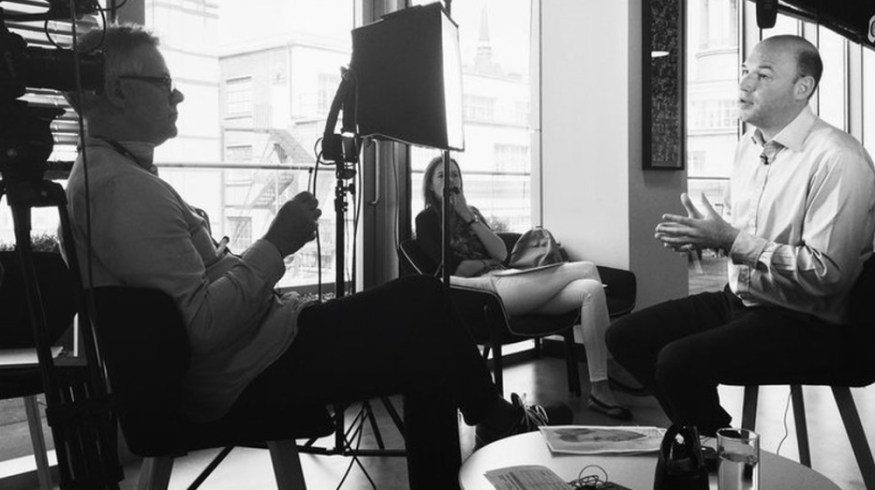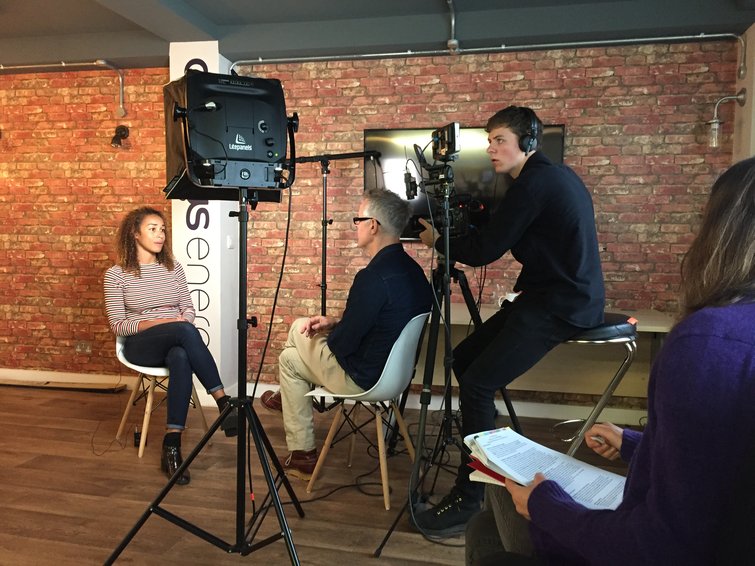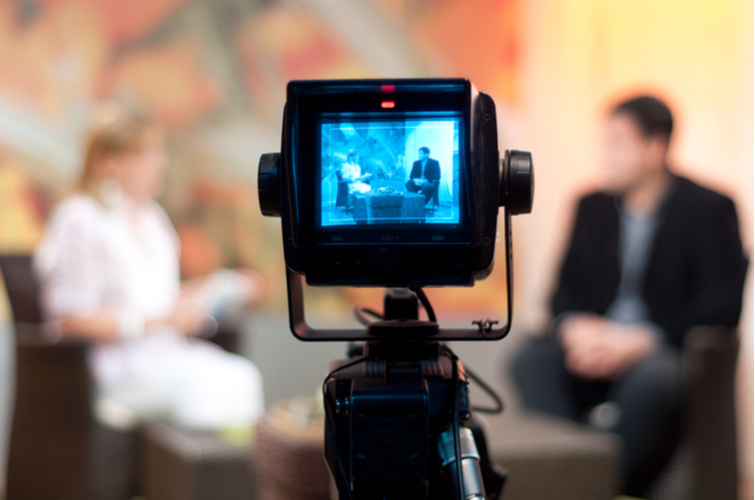
Jeremy Higham’s Advice on How to Become a Better Interviewer
Become a stronger interviewer with valuable tips from filmmaker Jeremy Higham.
Skilled interviewing is a well-honed craft. Jeremy Higham has been described as a connoisseur on the subject. He has finessed his interviewing technique over the last thirty-three years, cutting his teeth on documentaries before starting his own production company. I recently caught up with him to discuss his expertise.
Here are some excerpts from our chat, along with some of my takeaways.

It’s essential to earn the trust of the person you’re interviewing by actually listening and engaging in their responses. Image via wearehighamco.
Throw Yourself Into the Deep End
PremiumBeat: When was your first interview?
Jeremy Higham: One of the first ones that I can remember was when I was twenty-three. I was hugely out of my depth, interviewing the head of the health service in Belfast. I felt so incredibly nervous, but threw myself in nonetheless. He was actually interested in my questions, which amazed me.
Takeaway: Like with many pursuits, to develop your skills as an interviewer, you often have to throw yourself into the deep end. Even the greats felt uncomfortable when they started.
Take a Gentle, Kind Approach
PB: How have you progressed as an interviewer?
JH: In the early days of my career, I was actually quite manipulative in my style of questioning. The television company I was working for put pressure on us to deliver strong content. I was absolutely convinced, back then, that I needed to slightly manipulate the interviewee to get good material out of them. I have come on a journey of discovering that actually gentleness is the key. Being kind to someone is what allows them to open up. If you treat the person you are speaking to well, you will get what you need for your video — without compromising your integrity.
When I was 35, I had a very intense spiritual awakening, which gave me a whole new perspective on human nature. This completely revolutionized how I saw those that I interviewed. My success has come from adopting a new belief system and sense of identity. I believe every single human being I am put in front of is absolutely unique. They’ve experienced difficulties that I haven’t and they can see aspects of life that I can’t see. That fascinates me, which is why people open up to me!
Takeaway: It’s important not to be tempted into being pushy with your interview subject. Even if applying the pressure gets you the answers you’re looking for, it may damage your reputation. It also, to quote Jeremy, “does a disservice to humanity.” What’s more, it’s worth reflecting upon your core values and belief system, as this will profoundly effect how you connect with those you’re filming. You can’t just summon up fantastic interviewing skills if, at a deep level, you don’t really care about people.
Pay Real Attention, Adapt Accordingly

Focusing on your subject’s answer can make your next question stronger. Image via IxMaster.
PB: Are there any classic mistakes you’ve seen others make in this area?
JH: I remember being interviewed on radio about a documentary I had made. This well-known interviewer I was speaking to made a textbook mistake. At the end of each answer, she didn’t base her next question on what I had just said, she didn’t even really seem to be listening. She seemed more focused on just getting through the questions someone else had given her. Within three or four minutes, my confidence to talk had severely depleted. Fully focusing on the answers of the interviewee is such a vital part of the process.
Takeaway: Always pay close attention to what’s being said, and adapt your questions in response to the previous answers. If you seem disinterested, you wont capture the high-quality content you’re looking for.
Remove the Safety Net to Create Thrilling Authenticity
PB: Do you prepare questions before a shoot?
JH: I never take pre-prepared questions in with me. I don’t even allow interviewees to take in notes. Until you remove the safety net that comes from this, you will never thrill the audience. Answering without notes is vulnerable and the audience is dying to see that vulnerability. For me, authenticity is everything. I want to come away with a new understanding, which I won’t do if I’m reading questions off a list.
Takeaway: This suggestion is challenging. We all fear that awkward silence that happens when people are trying to come up with answers and questions on the spot. If you’re feeling brave, try going notes-free in pursuit of more authentic content. If you’re not there yet, you could memorize a few safety questions while still allowing most of the interview to occur unprompted.
Cultivate a Relaxed Environment
PB: How do you help people relax when you’re chatting with them on camera?
JH: I think people are uptight because they think you are going to treat them in a certain way. I try not to be too professional with them. Back when I smoked, I used to light up at the beginning of an interview. As a result, any professional facade dissipated, allowing us to have a far more relaxed conversation.
Takeaway: It’s always helpful to be aware of the atmosphere you’re creating when interviewing. Think about your posture and body language. They can’t relax if you’re tense. Think about the set. Are the chairs comfortable? Is there a small table nearby where your subject can place a glass of water? How’s the lighting? How’s the temperature? All these variables are yours to control.
Don’t Stop Until Everything Is Said
PB: Do you have any other wisdom that you could share on this subject?
JH: I have nicknamed one of my favorite techniques “burping the baby.” When you burp a baby, the last few burps are the hardest to get out. But, if the baby doesn’t get them out, they will be left feeling dissatisfied.
In a similar way, very often an interviewee has something fascinating they would like to talk about that might remain unsaid if not prompted. I will calmly say, “We’re going to turn the camera off soon. Is there anything that, if you don’t talk about it now, you will later regret? Let’s just pause a moment.”
That moment becomes a pregnant pause. If they say they have nothing more to add, I still encourage them to stop for a second. All too often, they then chirp up with something absolutely compelling.
Takeaway: Don’t be tempted to wrap things up too quickly. Being patient definitely pays off in this context. Give this technique a go, the results will likely surprise you.
Here are a few more helpful resources that explore the ins and outs of interviewing:
- A Guide to Shooting Interviews as a One-Person Crew
- 7 Filmmaking Interviews with Real-World Career Advice
- A Guide to Developing Questions During Documentary Interview Shoots
- Shooting Video Interviews with Two People at Once
- Video Tutorial: How to Create Cinematic One-Light Setups
Cover image courtesy of Jeremy Higham’s Instagram via wearehighamco.





